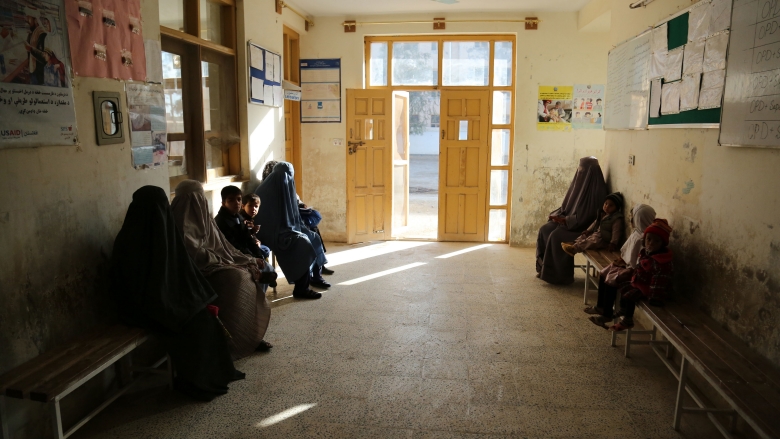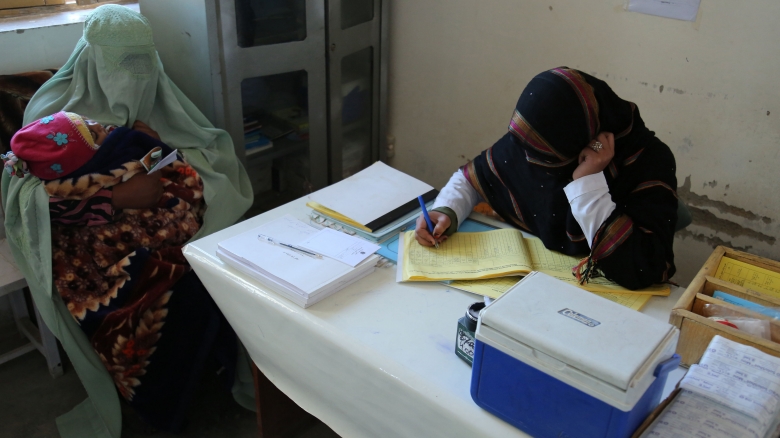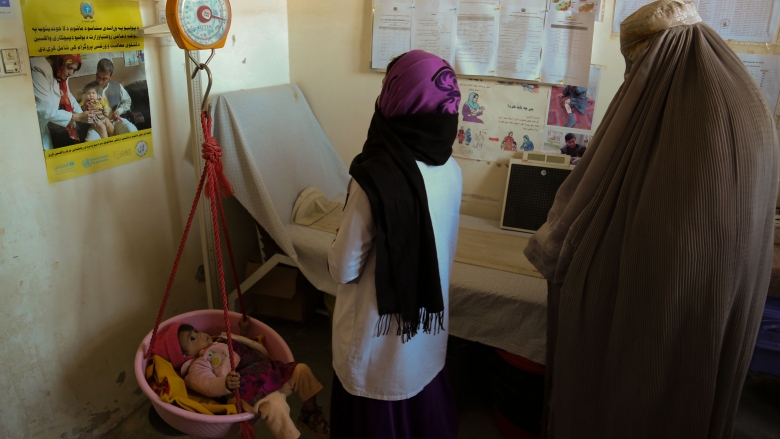KANDAHAR CITY, Kandahar Province – Women, quietly talking to each other, wait patiently in line for their check-up outside the examination room of the gynecology and obstetrics department of the Clinic. Among them is Bibi who has accompanied her daughter-in-law for a check-up.
“This clinic has solved many of my family’s health problems,” says Bibi. “As it is near our house, we come here whenever someone is sick in my family.” She is also pleased to hear that other Kandahar residents have similar access to clinics in almost every part of the province.
One of the biggest triumphs of increasing access to clinics such as Shams Kakar has been the near eradication of polio in Kandahar Province. Thanks to the vaccination centers in the clinics, the province has seen a dramatic decrease in polio cases, from 36 cases in 2011 to just one in 2016 so far, without a single case in 2015. Clinic doctors are hopeful that continued vaccination and health service provision will lead to the ultimate eradication of polio in the province.
Increased access to basic health services, including vaccinations, is a result of the System Enhancement for Health Action in Transition (SEHAT) project, implemented by the Ministry of Public Health (MoPH). SEHAT is supported by the International Development Association (IDA), the World Bank Group’s fund for the poorest countries, and the Afghanistan Reconstruction Trust Fund (ARTF), in partnership with multiple donors.
SEHAT aims to expand the scope, quality, and coverage of health services provided to the population, particularly to the poor. It supports the provision of a basic package of health services and an essential package of hospital services to the entire country. The services are implemented through performance-based partnership agreements between MoPH and non-governmental organizations (NGOs), which deliver health services as defined in these packages.
In Kandahar Province, most of the health services are delivered by BARAN, an NGO, in 17 districts. “Our activities through 46 health centers and 1,102 health posts have had a great impact,” says Dr. Basharmal, health coordinator. “One good proof of the successful work is the near eradication of polio in the province. We recorded zero cases of polio in 2015 in Kandahar Province.”
High level of trust in clinic staff
Shams Kakar Clinic is one of the clinics run by BARAN and one of nearly 46 health centers in Kandahar Province operating under the umbrella of the SEHAT project. The clinic, in District 7 of Kandahar city, was built as a Comprehensive Health Center in 2005. Initially, it covered a community of about 27,000 people, but its coverage has since doubled to over 50,000. A total of 18 staff — including medical doctors, midwives, laboratory technicians, pharmacists, and vaccination and nutrition specialists —take care of over 2,500 patients every month.
Waliullah of the clinic, points out that many people benefit from the clinic’s free services. “Since all services at the clinic are offered free, a high number of people visit it. They are satisfied with the performance of this clinic,” he says.
Vaccinations are just one of the many health services the clinic offers. The clinic’s gynecology and obstetrics department are open daily, providing regular check-ups and delivering babies. Midwife Nooria, has been working at the Clinic for over a year. “The clinic receives nearly 50 gynecology and obstetrics visitors daily. There are up to three deliveries performed in the clinic every day,” she says. “We solve over 80 percent of women’s gynecological and obstetric issues in this clinic, and this has allowed patients to develop trust in the clinic and its staff. Now, even nomads visit the gynecology and obstetrics department of the clinic.”



